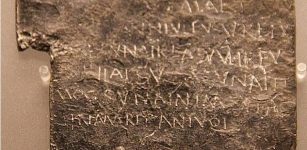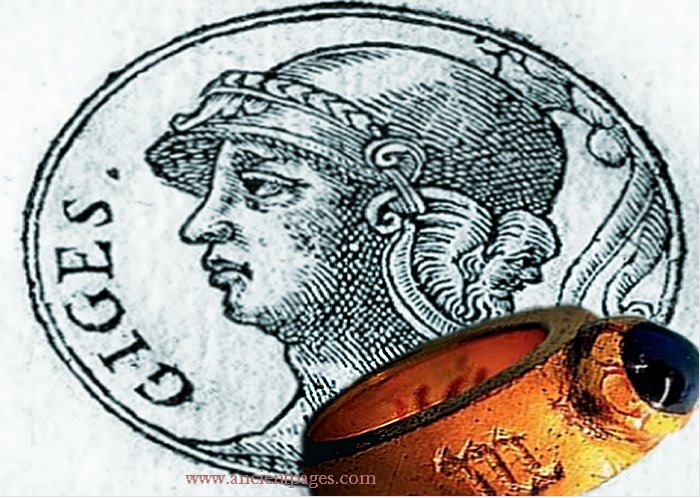Magical Ring Of Gyges And Its Power To Be Invisible At Will
A. Sutherland - Ancient Pages.com - Gods and other mythical creatures often had the help of magical and powerful objects.
In myths and legends, these objects are often forged by dwarfs who are highly skilled craftsmen and can also provide magical functions to their works.
One such famous object is Andvaranaut, a magical ring that worked like a magnet to attract gold. The dwarf Andvari owned this ring, but it was stolen by the trickster god Loki. It forced Andvari to put a curse upon his golden treasure, including Andvaranaut. His curse meant the owner's accident and terrible death.
Another unique magical ring was Draupnir (Draupner – 'the dripper') in Norse mythology. It belonged to the god Odin and was also forged by dwarfs. Draupnir could multiply itself, meaning every ninth night, eight new rings 'drip' from Draupnir, each of the same size and weight as the original.
The Ring of Gyges is another magical artifact mentioned by the philosopher Plato in Book 2 of his work 'Republic.' It granted its owner the ability to become invisible at will.
Gyges was the founder of the Mermnad dynasty of Lydian kings, and also the first known king of the Lydian kingdom to have attempted to transform it into a mighty empire. Gyges reigned c. 680-644 BC. There are different accounts of his rise to power, but one is that of Glaucon (c. 445 BC – 4 BC), an ancient Athenian and the philosopher Plato's older brother.
His version of the story is that an unidentified ancestor of Gyges was a shepherd who served as the ruler of the ancient kingdom of Lydia (today, modern-day Turkey). After an earthquake, a cave was exposed in a mountainside where he was feeding his flock. The shepherd entered the cave and found a tomb with a bronze horse containing a corpse larger than a man wearing a golden ring.
He took the ring, and when he carried it, he suddenly realized something unusual had happened.
 A rare depiction of the legend of Gyges finding the magic ring, Ferrara - 16th century. Author - anonymous source: dorotheum - Public Domain
A rare depiction of the legend of Gyges finding the magic ring, Ferrara - 16th century. Author - anonymous source: dorotheum - Public Domain
The ring gave him the power to become invisible by adjusting it. Then, he was chosen as one of the messengers who reported to the king the status of the flocks. With his power of invisibility, he seduced the queen, who helped him to murder the king. Thus, the shepherd became king of Lydia himself.
The magical ring known as the 'Ring of Gyges' is perhaps a mythical object, but Gyges himself existed and was a historical figure, though barely anything is known about his life and reign.
According to 'The Histories of Herodotus,' Gyges, a subordinate of King Candaules of Lydia, killed this royal figure and seized the throne. He had seduced Candaules' Queen before killing him and married her afterward.
There are different interpretations of this legend about the 'Ring of Gyges.' Through the story of this ring, one asks whether a person who finds such a ring will misuse its power.
Was it the magical ring that helped him to obtain these achievements?
In Plato's 'Republic, the role of the legend about the ring has a moral meaning. One important question arises: whether any man can be so honorable and promising that he could resist the temptation of being able to perform any act without being known or discovered.
If we assume that morality is only a social construction, the source of which is the desire to maintain one's reputation for virtue and justice, what would happen if that sanction was removed?
Would one's moral character fade away? Would an intelligent person be honest if he did not fear being caught and punished for his deeds?
The story raises several interesting moral issues. How far would we go if granted the power to become invisible?
The 'Ring of Gyges' story became food for thought for thinkers and authors. Examples include 'The Invisible Man' by H.G. Wells and the story of the ring by JRR Tolkien.
Written by – A. Sutherland AncientPages.com Staff Writer
Updated on Oct 3, 2023
Copyright © AncientPages.com All rights reserved. This material may not be published, broadcast, rewritten or redistributed in whole or part without the express written permission of AncientPages.com
Expand for referencesMore From Ancient Pages
-
 Resourceful Neanderthals Could Dive 13ft If Necessary To Collect Shells
Archaeology | Jan 16, 2020
Resourceful Neanderthals Could Dive 13ft If Necessary To Collect Shells
Archaeology | Jan 16, 2020 -
 Unique 8,000 Year-Old Child Burial Reveals Its Secrets
Archaeology | Nov 3, 2020
Unique 8,000 Year-Old Child Burial Reveals Its Secrets
Archaeology | Nov 3, 2020 -
 Unsolved Mysteries Of Cahokia – What Really Happened With The Large Metropolis?
Civilizations | Jan 15, 2015
Unsolved Mysteries Of Cahokia – What Really Happened With The Large Metropolis?
Civilizations | Jan 15, 2015 -
 Defixiones: Ancient Roman Curse Tablets Became Big Business
Ancient History Facts | Apr 10, 2016
Defixiones: Ancient Roman Curse Tablets Became Big Business
Ancient History Facts | Apr 10, 2016 -
 Beautiful Ancient Egyptian Jewelry From The 26th Dynasty Unearthed At Karnak Temples
Artifacts | Mar 3, 2025
Beautiful Ancient Egyptian Jewelry From The 26th Dynasty Unearthed At Karnak Temples
Artifacts | Mar 3, 2025 -
 Ancient Ruins Of Nero’s Theater Discovered Under Garden Near Vatican
Archaeology | Jul 27, 2023
Ancient Ruins Of Nero’s Theater Discovered Under Garden Near Vatican
Archaeology | Jul 27, 2023 -
 Mystery Of The 3,500-Year-Old ‘Screaming Woman’ Mummy Solved
Archaeology | Aug 9, 2024
Mystery Of The 3,500-Year-Old ‘Screaming Woman’ Mummy Solved
Archaeology | Aug 9, 2024 -
 Takshashila: Renowned Learning Center That Attracted Buddhist Masters, Disciples And Students Of The World
Featured Stories | Jul 23, 2016
Takshashila: Renowned Learning Center That Attracted Buddhist Masters, Disciples And Students Of The World
Featured Stories | Jul 23, 2016 -
 Amazing Ancient Underwater Treasures And Temples Discovered At Thonis-Heracleion
Archaeology | Sep 20, 2023
Amazing Ancient Underwater Treasures And Temples Discovered At Thonis-Heracleion
Archaeology | Sep 20, 2023 -
 Ancient History Of The Samurai Armor
Featured Stories | Aug 27, 2018
Ancient History Of The Samurai Armor
Featured Stories | Aug 27, 2018 -
 Mystery Of Gribshunden – Danish Royal Sunken Ship Sheds New Light On Psychological Warfare In The Middle Ages
Archaeology | Apr 14, 2017
Mystery Of Gribshunden – Danish Royal Sunken Ship Sheds New Light On Psychological Warfare In The Middle Ages
Archaeology | Apr 14, 2017 -
 Mysterious White Mass On The Heads Of The Tarim Basin Mummies Identified
Archaeology | Oct 1, 2024
Mysterious White Mass On The Heads Of The Tarim Basin Mummies Identified
Archaeology | Oct 1, 2024 -
 Afterlife Of Egyptian Religious Statues Intentionally Hidden In The Temple Of Ptah At Karnak
Archaeology | Sep 22, 2017
Afterlife Of Egyptian Religious Statues Intentionally Hidden In The Temple Of Ptah At Karnak
Archaeology | Sep 22, 2017 -
 A 2,500-Year-Old Planned City In Tarighat, Chhattisgarh, India
Civilizations | Oct 8, 2014
A 2,500-Year-Old Planned City In Tarighat, Chhattisgarh, India
Civilizations | Oct 8, 2014 -
 Göbeklitepe-Like Kahin Tepe Is Oldest Worship Place In Black Sea Region – Interesting Finding
Archaeology | Sep 30, 2020
Göbeklitepe-Like Kahin Tepe Is Oldest Worship Place In Black Sea Region – Interesting Finding
Archaeology | Sep 30, 2020 -
 Food Insecurity Led To An International Conflict 2,000 Years Ago
Archaeology | Sep 22, 2022
Food Insecurity Led To An International Conflict 2,000 Years Ago
Archaeology | Sep 22, 2022 -
 Unexplained Mystery Of The Glowing Woman Who Baffled Scientists
Featured Stories | Jun 6, 2022
Unexplained Mystery Of The Glowing Woman Who Baffled Scientists
Featured Stories | Jun 6, 2022 -
 Rosicrucians’ Secret Knowledge Of Atlantis, Pyramids And Extraterrestrial Visitations
Civilizations | Apr 17, 2017
Rosicrucians’ Secret Knowledge Of Atlantis, Pyramids And Extraterrestrial Visitations
Civilizations | Apr 17, 2017 -
 Spir Mountain Cairns: Prehistoric Ancient Monuments To The Dead In Northern Sweden
Featured Stories | Jan 12, 2022
Spir Mountain Cairns: Prehistoric Ancient Monuments To The Dead In Northern Sweden
Featured Stories | Jan 12, 2022 -
 Recently Found ‘Neanderthal Footprints’ In the South Of Spain Could Be 275,000 Years Old
Featured Stories | Dec 1, 2022
Recently Found ‘Neanderthal Footprints’ In the South Of Spain Could Be 275,000 Years Old
Featured Stories | Dec 1, 2022

